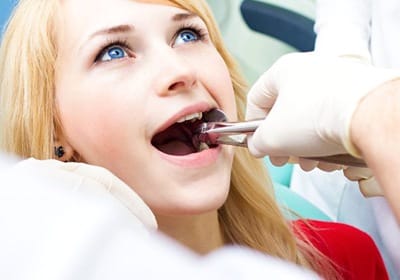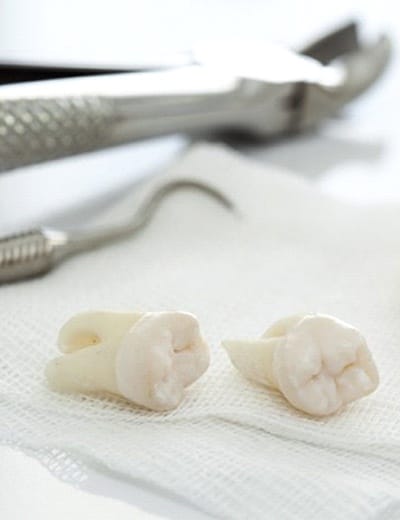Tooth Extractions – North Dallas, TX
Doing What’s Best for Your Smile

While tooth extractions are often far from the first treatment considered, there are instances where Dr. Rouhani will perform them if absolutely necessary. When a tooth is putting your oral health at risk, an extraction can be the most effective solution moving forward. If we determine that is the case, we’ll make sure that your treatment is comfortable, efficient, and accommodating from start-to-finish. If you’re experiencing severe decay or discomfort in your tooth, don’t hesitate to call our dental office today to learn more about tooth extractions in North Dallas, TX!
Why Choose Dental Attraction for Tooth Extractions?
- Many Tooth Replacement Options Available In-House
- Calming Nitrous Oxide for Nervous Patients
- Dentist Listens to Your Needs
When Does a Tooth Require an Extraction?

If a tooth is being extracted, it’s likely because it has sustained a significant amount of damage from decay or a physical injury. Decay puts neighboring teeth at risk, while a cracked or severely fractured tooth can increase the risk of an oral infection spreading. Additionally, removal may be needed if it erupts underneath existing teeth, which is common for wisdom teeth. Regardless of the cause, we’ll make sure that you understand your treatment in great detail before going through with it.
The Tooth Extraction Procedure

There are two ways we may perform a tooth extraction: by pulling it out or using surgical extractions. For a tooth that has fully emerged above the gumline, we can simply pull the tooth out. First, we numb the area around the tooth. Then, we rock the tooth back and forth with a clasping tool until it breaks free from the gums.
When the tooth is impacted, or stuck in the gumline due to surrounding teeth, we perform a surgical extraction. Sometimes, this procedure can be as simple as making an incision in the gumline to reveal enough of the tooth to extract it. Other times, we may have to drill into the bone tissue or even break the tooth into sections and remove it piece by piece. Since each patient’s situation is unique, we’ll plan out every detail of your procedure at your consultation so you know what to expect.
What to Expect After a Tooth Extraction

After your tooth has been removed, we’ll outline a specific treatment plan to care for your smile during your recovery. Typically, we’ll prescribe pain medications to help you deal with any soreness or discomfort. You can also manage swelling and pain by applying a cold compress. Additionally, we’ll give you instructions such as when and how to change your gauze, caring for your remaining teeth, and warning signs that mean you should call your emergency dentist in North Dallas. For a few days following your extraction, we normally advise that you stick to a soft food diet and avoid smoking and drinking through a straw, so as not to disturb the extraction site. You can gradually introduce more varied foods into your diet as you recover and grow more comfortable.
Understanding the Cost of Tooth Extractions

It’s perfectly understandable that you would be interested in the cost of a tooth extraction when you learn you need one. The cost of removing a tooth varies among patients, and it is largely determined by several key factors. Here’s a brief guide to how tooth extractions are priced at Dental Attraction, but please feel free to contact our staff if you’d like to learn more.
Factors That Can Affect Tooth Extraction Cost

While we won’t be able to provide you with a proper cost estimate until we’ve evaluated your oral health at our Dallas office, there are a few factors that determine large parts of the total amount. These include:
- The number of teeth being extracted.
- The location of the tooth being extracted, as those in the back of the mouth are hard to reach and have more complex root anatomy, which makes removing them more difficult.
- The need to refer the patient to a specialist in especially complex cases.
- The cost of the device used to replace the tooth such as a dental bridge, denture, or dental implant.
Does Dental Insurance Cover Tooth Extractions?

Dental insurance policies frequently cover tooth extractions at around 50% after the deductible has been met, and this includes wisdom teeth. However, your plan may impose limitations such as only covering a certain number of teeth or a waiting period before the coverage takes effect. Since every plan is different, we’ll be happy to go over your policy with you during your consultation so you can know exactly what your insurance will cover.
How to Make Tooth Extractions Affordable

A tooth extraction may be necessary for a patient’s oral health even if their budget is tight. To help ensure that everyone can get the care that they need, we offer several options that can make tooth extraction more affordable, including:
- Flexible Financing Options: We partner with trusted third-party financiers such as Cherry, CareCredit, and Lending Club to offer our patients payment plans that can break their dental bills into monthly installments that can be easily managed.
- Emergency Exam Special: We currently offer a special that includes one emergency exam and X-rays for $49.
- Complimentary Dental Implant Consultation: We’ll be happy to help you understand your tooth replacement options and discuss your goals for your smile.
We’re eager to give you the help you need to keep your smile healthy and pain-free. If you believe you need a tooth extraction, contact our office to schedule a consultation or if you’d like to learn more about your insurance and financing options.
Tooth Extraction FAQs

While extracting a tooth is almost never our first option, sometimes it’s necessary to preserve your oral health. Although this is actually a fairly common procedure, many patients still tremble in fear when they learn that they have to get a tooth removed. This is often due to not knowing very much about the procedure. To help set your mind at ease, we’ve decided to answer some tooth extraction FAQs in North Dallas down below.
How Long Does a Tooth Extraction Take?
This depends on how many teeth need to be removed. If you’re only having one tooth extracted, the process can often be completed in about half an hour. Each additional tooth can take up to 15 more minutes, depending on where in the mouth it is located and whether it’s impacted.
How Much Does a Tooth Extraction Cost?
Again, the answer to this question can vary greatly from patient to patient. It should go without saying that the more teeth are being extracted, the higher your cost will be. It also costs more to remove impacted teeth than non-impacted teeth. We’ll go over your personalized cost and your options for paying for your tooth extraction during your consultation at our dental office near Hebron.
Are Tooth Extractions Painful?
Before we begin the process of extracting your tooth, we’ll administer a potent local anesthetic to numb the area of your mouth we’ll be working on. While you may feel a slight pressure during the procedure, you shouldn’t experience any pain in the slightest. If you need help soothing your nerves and relaxing, we offer nitrous oxide sedation. This sedative will greatly calm you down, lower your ability to feel pain, and generally make you less aware of your surroundings during the procedure.
After the anesthetic and sedation wear off, the extraction site may be sore. Be sure to follow our post-op instructions to a tee and take your prescribed pain medication as needed. In most cases, any discomfort subsides in less than a week.
What Should I Avoid Doing After a Tooth Extraction?
You may have heard about dry socket, which is the most common complication that can develop after a tooth extraction. When a tooth is removed, a blood clot starts to form over the site so it can heal. Certain activities can dislodge the blood clot, resulting in dry socket. This exposes the tissue and bone underneath the blood clot and can be quite painful.
Most of the time, you can prevent dry socket as long as you avoid doing any of the following in the first 48-72 hours after your extraction:
- Smoking
- Drinking through a straw
- Spitting or rinsing forcefully
- Blowing your nose or sneezing aggressively
- Rigorously exercising
